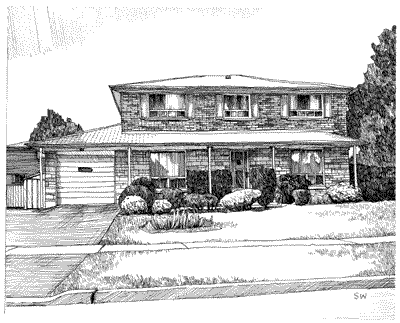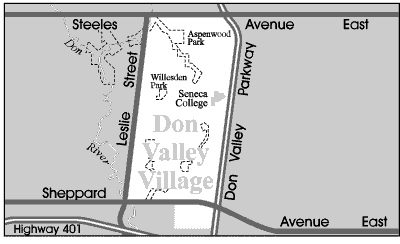|
History of Don Valley Village
3303 Don Mills Rd, Unit 2807 , Toronto, Ontario M2J4T6 , SKYMARK

The Don Valley Village neighbourhood was developed in the 1960's and
1970's. However the pre-subdivision history of this area dates back to the
early 1800's, when Don Valley Village was comprised of a collection of
small farming hamlets. Only three historical landmarks remain from the
pioneer days of Don Valley Village. These vestiges include the Zion
Primitive Methodist Church, circa 1873, located at 1650 Finch Avenue East,
and the charming little red brick Zion Schoolhouse, circa 1869, located at
1091 Finch Avenue East. The only pioneer home still standing in this area
is the Alexander Muirhead Victorian style farm house, circa 1853, located
at 179 Old Sheppard Street. This house was originally part of the former
O'Sullivan's Corners, a crossroads community that once thrived at the
corner of Victoria Park and Sheppard Avenues.
Bayview Village began as a small rural farming community in the 1800's.
One of this area's first settlers was Thomas Clark, a father of seven
children and an influential member of the community. The Clark house,
built circa 1885, and located at 9 Barberry Place, is the only dwelling
that remains from Bayview Village's pioneer days.
The present day Bayview Village neighbourhood was planned in 1954 by a
group of developers led by Farlinger Development Ltd. Bayview Village was
hailed as "contemporary living in the countryside, at the doorstep of the
urban concentration of Metropolitan Toronto."
The town planner for Bayview Village was Dr. E. G. Faludi, who also
designed the Rexdale, Thorncrest Village, and Humber Valley neighbourhoods
in Toronto. Faludi's trademark curvilinear street pattern that follows the
natural contours of the land was designed to highlight the natural beauty
of this neighbourhood.
Bayview Village's novel approach to neighbourhood building combined
with affordable house prices, which ranged from $16,000 to $40,000, helped
make this subdivision an instant success. A residents association was
formed in 1956 and by the early 1960's Bayview Village was completely
developed.
Ed Note. A number of Bayview Village streets such as Citation, Candida,
and Bunty Lane are named after famous race horses.

|